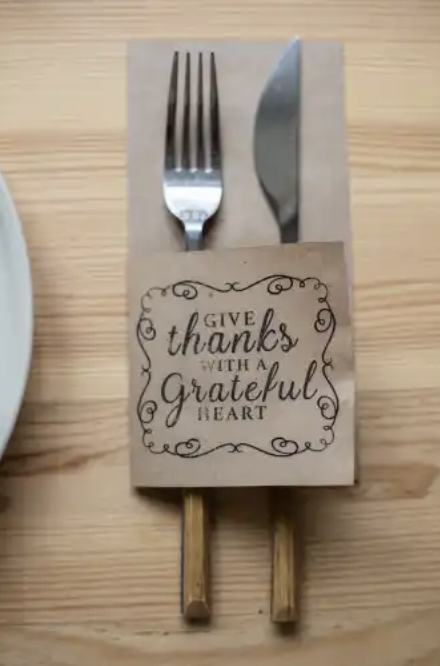This Thanksgiving: platitudes or gratitudes?
Photo by Joni Lorraine on Pexels.com
Tis the season for giving thanks and showing gratitude. Just check the web and you’ll see a slew of Thanksgiving quotes reminding us to do just that — be thankful. Of course, I certainly agree with that advice. Who wouldn’t. But it also made me ponder about that feeling of gratitude. The how and why of it. How do we get beyond the simple platitude of being thankful, and is there value in doing so.
Gratitude is rooted in the Latin word gratia, meaning grace, graciousness, gratefulness. Defined, gratitude is “the quality of being thankful; the readiness to show appreciation for and return kindness.” Okay. That’s a good thing to do. But beyond that, is there value to you and to me. Again, a simple web search reveals numerous research studies that point to the many benefits of feeling grateful and expressing gratitude.
In fact, for every benefit I will mention, there seems to be a research study supporting the advantages of being grateful. Advantages that improve everything from your physical health to your mental stability and emotional well being. One such study was “Counting Blessings versus Burdens: an experimental investigation of gratitude and subjective well being. It identified six areas where expressing gratitude has benefits:
—Gratitude opens the door to more opportunities and relationships. We all thrive on feeling appreciated, and when someone shows that appreciation and tell us they are grateful, it makes us feel good. Just yesterday a young grocery clerk carried my groceries to the car. I thanked her, handed her a five and told her how much I appreciated it. This normally sullen young girl gave me a smile and a big thank you in return. What goes around comes around.
—There are actual improvements in physical health from being grateful. The study showed that grateful people actually experience fewer aches and pains. Grateful people apparently also are more aware of their health and take better care of themselves. A little like a self-fulfilling prophesy.
—Expressing gratitude improves psychological health and mental strength. The study examined subjects’ reactions to traumatic events and discovered that those who were thankful weathered the dire circumstances much better.
—Gratitude enhances empathy and reduces aggression. Like the reaction by the young girl at the grocery store, an expression of gratitude and thankfulness shown to someone comes back to the receiver. Giver and receiver both feel better about each other and themselves.
—Thinking about what you’re grateful for can even help you sleep better. No need to cite a research study here. I can just hear Bing Crosby singing that great song by Irving Berlin: When you’re worried and you can’t sleep, just count your blessings instead of sheep, and you’ll fall asleep counting your blessings.”
–-Being grateful improves your self esteem. Focusing on what you have rather than what you don’t have changes the focus. It reduces social comparisons. Grateful people are able to appreciate both their own accomplishments and those of others. That leads to a more pronounced feeling of happiness and long lasting well being for everyone involved.
Author and speaker Brenee Brown has written and spoken quite often on the value of showing gratitude. In fact, she believes it’s the basis for bringing true joy into our lives. She notes, “The most effective way to cultivate joy in our lives is to practice gratitude.” She makes a point of encouraging her children to express gratitude with a Mason jar on their kitchen counter. The family members can drop in gratitude notes that are then shared at the family dinner table.
I think it’s important to mention the “practice” of gratitude because that’s what it takes — practice. It doesn’t just happen or if it’s done without much meaning, I suspect the benefits may not be as pronounced. Oh sure, we say thank you and respond with a smile, but do we internalize it and in so doing transfer that feeling to those around us. Do we think before we thank?
Again, checking the web. there are several suggestions on how to develop a state of gratitude. Maybe as you fall asleep or upon waking in the morning, just think about one or two things for which you’re grateful. We all reach for our phones on a regular basis. Take a second to open the notebook app on your phone and type in something you’re grateful for. At Mindful.org there were several suggestions on how to exercise our gratitude muscles.
For me, I often use morning pages, that 15-30 minutes of writing that often reveals what has made me happy and grateful. Another time I focus on gratitude is when I say the rosary. With that oft used Catholic prayer, I devote the first decade (10 beads) to what I’m particularly grateful for that day.
As we move toward the Thanksgiving holiday, it is a logical time to express gratitude. But clearly, there is value in making it a part of our daily lives. As my family gathers round the table for our Thanksgiving Day meal, I will definitely ask that we all share one thing we’re grateful for. But I will also remind them that there is something each and everyday that has made our day better — even is the day itself. As my husband and I say nearly daily, “Every day is a gift.”
Photo by Monstera on Pexels.com

